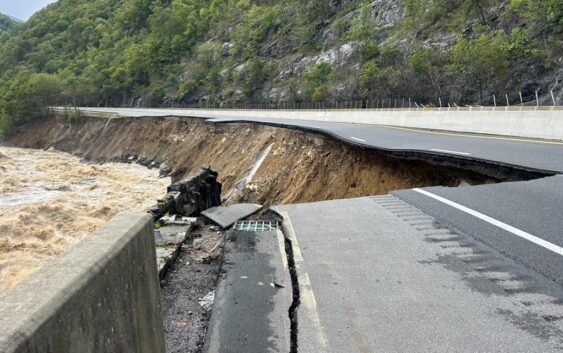- CenterPoint Energy accelerates infrastructure improvements ahead of hurricane season
- Carolina Hurricanes playoff tickets go on sale Thursday
- Ask the Meteorologist: Why do tornadoes target Tornado Alley, Dixie Alley?
- Nonprofit closes distribution site that aided thousands after Hurricane Helene
- Trump approves federal assistance amid Arkansas flooding
I-40 will remain closed for 'months' at the TN state line after catastrophic flood damage

Historic flooding in East Tennessee and North Carolina swept away a part of I-40 East near the state line on Friday.
KNOXVILLE, Tenn. — Historic flooding in East Tennessee knocked out part of the interstate system as Hurricane Helene moved through the area, dumping historic amounts of rain and putting communities underwater.
The storm made I-40 impassable in multiple spots including near the state line, according to the North Carolina Department of Transportation. It also closed dozens of Tennessee roads and closed I-26 near the state line.
Donald Maier, an associate professor of practice at the University of Tennessee’s supply chain program, said the roads are popular routes for freight shipments that move from west to east. He also said shipments that move from north to south would use I-26.
“Now all of a sudden, you have essentially a bottleneck that basically is gone,” he said. “With those two interstates being removed, what’s the freight going to travel on?”
He said the impact of the road closures could impact inventories at grocery stores or bulk shipments like lumber because truckers need to drive more miles to deliver shipments between eastern and western locations. He also warned that the prices of consumer goods would likely rise by around 20% in the short term and by up to 40% if the effects are compounded by a dockworker strike.
He said the extent of the impact of the closure would be determined by how quickly the states fix and reopen the roads.
“If I’m a truck driver, you just added double the amount of time it would take just for me to go from Knoxville to Asheville — the amount of time has doubled. That eats into my hours of service, or the legal amount of time that I can drive in a 24-hour period,” he said. “Obviously folks in Asheville or in northeast Tennessee are going to need to have more supplies just to survive. Getting that freight to them is just going to take a little longer.”
He also said backroads in the area could start to see more traffic, adding another level of complexity for truck drivers navigating between Tennessee and North Carolina. He said to go around the closures and blockages, they may need to take backroads.
“It’s probably going to be a quick week for just those lines to recover from this immediate issue. Long-term, we’re looking at something that’s going to last six or more months,” he said.
He also said supply chain issues could be complicated by the dockworker strike that started Monday night.